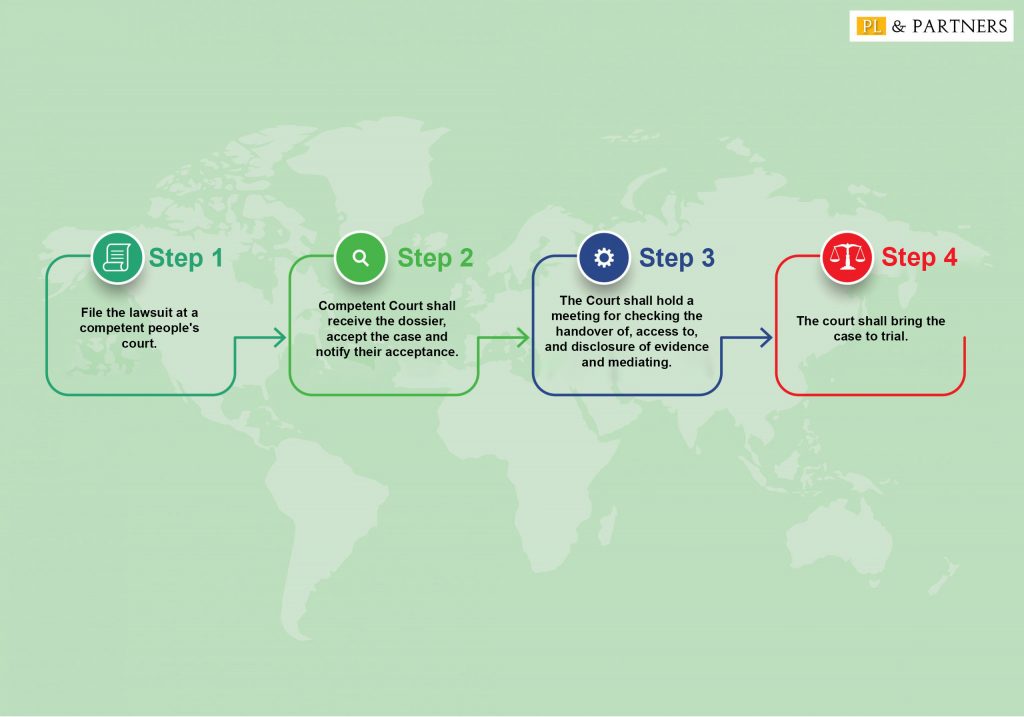Dispute over division of inheritance is a very common problem in our country these days. The dispute arises due to conflicts between heirs with respect to claiming an inheritance, rights, and obligations related to inheritance.
The consequences of disputes, if not resolved satisfactorily, can sometimes lead to heartbreaking outcomes and rifts in relationships between family members.
In developed countries, people always have the habit of preparing everything in advance, including making a will to simultaneously express their wishes regarding the division of assets, and minimize unexpected conflicts between the living person, also known as the inheritor.
In Vietnam, the issue of inheritance and making wills is not of much interest to many people. Therefore, inheritance disputes are still on the rise.
Unfortunately, your family is facing a deadlock on this issue, everyone cannot agree on the division of inheritance and wishes to request a competent people’s court to resolve it.
Through this article, PL & Partners Law Firm would like to highlight some legal regulations related to resolving inheritance disputes for your reference.

1. COMMON INHERITANCE DISPUTES:
- Dispute over order of i
- Disputes over estate.
- Dispute over understanding the will’s content.
- Dispute over determining the entity to perform the obligations of the deceased leaving the estate.
- Disputes over division of inheritance.
2. SUBJECTS HAVING THE RIGHT TO FILE A LAWSUIT ABOUT INHERITANCE DISPUTES:
When an inheritance dispute arises, those who have the right to inherit the inheritance can request a competent court to resolve their dispute in accordance with the law if they believe that their legitimate rights and interests are violated.
3. STATUTE OF LIMITATIONS TO INITIATE A LAWSUIT FOR DIVISION OF INHERITANCE:
Pursuant to Article 623 of the 2015 Civil Code:
- The statute of limitations for an heir to request for the division of estate is 30 years for real estate, 10 years for movable property from the commencement of At the end of this period, the estate shall belong to the heir who is managing it.
- The statute of limitations for an heir to request for confirmation of his or her inheritance rights or rejection of other people’s inheritance rights is 10 years from the commencement of inheritance.
- The statute of limitations for requiring heirs to fulfill obligations with respect to the property left by the deceased is 3 years from the commencement of
Thus, the plaintiff needs to pay attention to the above milestones to ensure the right to file a lawsuit in accordance with the law.
4. JURISDICTION:
4.1. Jurisdiction of district-level People’s Court:
- District-level People’s Court where the inheritance being a piece of real estate is located has jurisdiction over that inheritance dispute.
- In case the inheritance is not real estate, the court with jurisdiction is the district-level People’s Court where the defendant resides, works or at the plaintiff’s choice.
4.2. Jurisdiction of Provincial People’s Court:
- Provincial People’s Courts shall resolve inheritance disputes involving litigants or assets being abroad or where judicial entrustment to representative agencies of the Socialist Republic of Vietnam abroad, or foreign courts, competent agencies is required.
- Provincial People’s Court shall resolve inheritance disputes falling under the jurisdiction of the district-level People’s Court but the provincial People’s Court takes up to resolve on its own when It’s deemed to be necessary or at the request of the district-level People’s Court.
5. FILINGS OF A LAWSUIT OVER INHERITANCE DISPUTES:
– Petition;
– Documents on the relationship between the plaintiff and the deceased leaving the property: Birth certificate, ID card, marriage certificate, household registration book, adoption certificate to determine identity and order of inheritance;
– Death certificate of the deceased leaving the;
– Written inheritance declaration;
– Papers and documents proving the ownership of the deceased leaving the estate and the origin of his/her estate;
– Other documents: Minutes of settlement in the clan, minutes of settlement at the People’s Committee of commune, ward, town (if any), document of refusal to receive inheritance, etc.
6. GUIDANCE ON PROCEEDINGS FOR RESOLVING INHERITANCE DISPUTES:
- Step 1: File a lawsuit at the competent people’s court.
- Step 2: Competent Court shall receive the dossier, accept the case and notify their
- Step 3: The Court shall hold a meeting to check the handover, access, disclosure of evidence and mediation.
- Step 4: The court shall bring the case to trial

Hopefully, through the above content, you will partly grasp the basic provisions of the law related to inheritance disputes, know steps to take and things to keep in mind.
If you still have any questions or concerns, please contact PL & Partners Law Firm via our hotline 093.1111.060 for answers and dedicated support.
If you need legal assistance, please don’t hesitate to contact us at:
PL AND PARTNERS LAW FIRM
Headquarters: 46th Floor, Bitexco Financial Tower, No. 2 Hai Trieu, Ben Nghe Ward, District 1, Ho Chi Minh City, Vietnam
Office: Lot 1.16 Viva Riverside, 1472 Vo Van Kiet, Ward 3, District 6, HCMC
Hotline: 093.1111.060
Email: info@pl-partners.vn
Facebook: www.facebook.com/PLLaw
Website: www.PL-PARTNERS.vn – www.HOIDAPLUAT.net – www.THUTUCPHAPLY.org
We are always ready to assist you.










